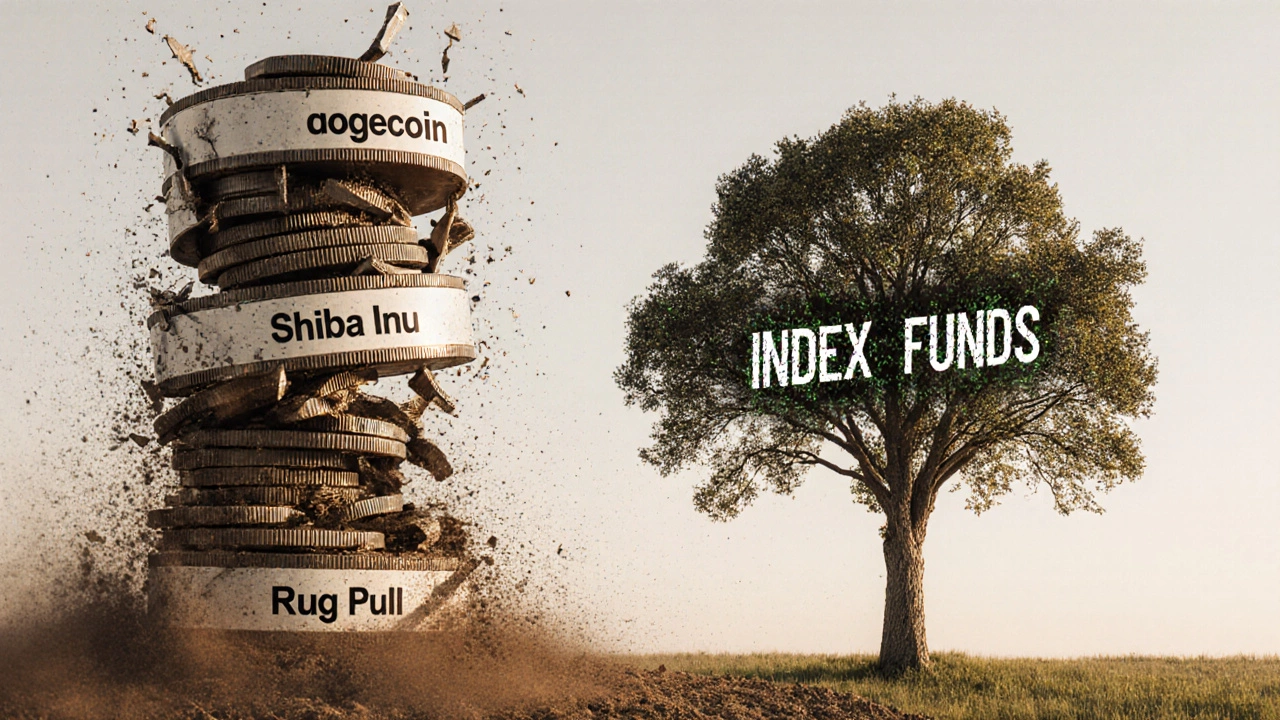Crypto Risk Comparison Calculator
Understanding Crypto Risk
Based on the article's findings, 68% of retail crypto investors experienced losses over 30% within their first year. This calculator compares crypto's volatility to traditional investments to show why crypto is fundamentally different from real assets.
Results
Enter values above to see a comparison of potential outcomes.
Bitcoin hit $120,000 in early 2025. Ethereum broke past $5,000. Crypto markets were buzzing. But here’s the truth most influencers won’t tell you: crypto’s biggest problem isn’t price drops or hacking-it’s that most people don’t understand what they’re actually buying.
It’s Not About the Tech-It’s About the Trust
People think crypto is about blockchain, decentralization, or smart contracts. Those are just tools. The real issue is trust. You’re not buying a stock in a company with financial reports, leadership, and a board of directors. You’re buying a digital token backed by code, community hype, and sometimes nothing more than a whitepaper written by someone who won’t even show their face.
Take Dogecoin. It started as a joke. In 2021, it hit $0.73. In 2025, it trades around $0.08. Why? Because its value wasn’t tied to utility-it was tied to memes and Elon Musk tweets. When the hype faded, so did the price. That’s not investing. That’s gambling with a tech gloss.
Compare that to Apple. If you buy Apple stock, you own a piece of a company that makes iPhones, has $180 billion in cash reserves, and pays dividends. Crypto? Most tokens have no revenue, no assets, no legal rights. If the project fails, you get nothing. Not even a refund.
Volatility Isn’t a Feature-It’s a Flaw
Crypto’s wild price swings are often sold as “opportunity.” But for the average person, volatility is a trap. Imagine putting your life savings into a crypto asset that loses 40% of its value in a week. You don’t just lose money-you lose sleep, confidence, and control over your future.
According to a 2024 survey by the Australian Securities and Investments Commission (ASIC), 68% of retail crypto investors in Australia experienced losses over 30% within their first year. Half of them said they didn’t understand why the price dropped. That’s not investing. That’s being exposed to risk without the knowledge to manage it.
Stock markets have circuit breakers. Banks have FDIC insurance. Crypto has none of that. If a major exchange collapses-like FTX did in 2022-you’re not getting your money back. There’s no government safety net. No lawyer to call. Just a blockchain ledger showing your balance… and silence.
The Regulation Gap Is Getting Worse
Some countries have clear rules. The EU has MiCA. Singapore has strict licensing. The U.S. still treats crypto like a legal gray zone-sometimes a security, sometimes a commodity, sometimes neither.
This confusion hurts real people. In 2024, a Brisbane man lost $87,000 investing in a “crypto savings account” that promised 12% monthly returns. The platform vanished. Police couldn’t help because the company wasn’t registered anywhere. No license. No address. No accountability.
Without regulation, crypto becomes a playground for fraudsters. Rug pulls, fake influencers, phishing scams-these aren’t rare. They’re the norm. The Crypto Scam Index from Chainalysis showed over $10 billion stolen in 2024 alone. And most victims were first-time investors who trusted a YouTube ad.

Adoption Isn’t Growing-It’s Stagnating
You hear “crypto is the future.” But look at the data. In 2025, less than 5% of Australians own any cryptocurrency. In the U.S., it’s around 8%. Compare that to 65% who own stocks. Why the gap?
Because crypto still doesn’t solve real problems. You can’t pay your rent with Bitcoin. Most doctors won’t take Ethereum for a checkup. You can’t use Solana to buy groceries at Coles. Even if you could, the fees and delays make it slower than using a credit card.
Real adoption means replacing existing systems-not creating parallel ones that only work for speculators. Bitcoin’s transaction speed is slower than Visa. Ethereum’s gas fees spike during peak times. And most DeFi apps require you to understand private keys, gas limits, and wallet connections just to swap tokens.
That’s not user-friendly. That’s a barrier for everyone who isn’t a tech expert.
The Real Problem: People Think It’s an Asset-It’s Not
Here’s the quiet truth: most crypto tokens aren’t assets. They’re speculative instruments. An asset generates value. A stock pays dividends. A bond pays interest. Real estate earns rent.
Crypto? Most tokens don’t generate anything. Their value comes from someone else paying more for it later. That’s called the Greater Fool Theory. And it only works as long as new buyers keep showing up.
When the flow slows-when hype dies, when regulators crack down, when inflation falls and interest rates rise-those tokens crash. And the people left holding them? They’re not investors. They’re victims of a psychological trap.
Think about it: if you bought a house and someone told you its value depended on whether a celebrity liked it on Instagram, you’d think they were crazy. But that’s exactly what’s happening with crypto.

What Should You Do Instead?
You don’t need crypto to build wealth. You need discipline, knowledge, and time.
- If you want exposure to digital innovation, invest in public tech companies like NVIDIA or Microsoft-they’re building the infrastructure behind blockchain.
- If you want diversification, use low-cost index funds. They’ve returned 8-10% annually for decades.
- If you’re curious about blockchain, learn how it works-but don’t put money into tokens you can’t explain.
There’s nothing wrong with learning about crypto. But treating it like a get-rich-quick scheme? That’s how people lose their savings. And it’s happening every day-in Brisbane, in Sydney, in London, in New York.
Bottom Line: Crypto’s Biggest Problem Is You
The technology has potential. But the market? It’s built on emotion, not logic. The biggest problem with crypto isn’t the code. It’s the people who think it’s a shortcut to wealth.
Until investors start asking: What does this actually do? and Who stands behind it?-and not just Will it pump next week?-crypto will keep being a gamble, not an investment.
The real winners won’t be the ones who bought at $20,000. They’ll be the ones who never bought at all-and kept their money where it belongs: in things that actually work.
Is crypto a good investment for beginners?
No. Crypto is not a good investment for beginners because it lacks transparency, regulation, and stable value drivers. Most new investors don’t understand what they’re buying, and the high volatility can wipe out savings quickly. Beginners are better off starting with low-cost index funds or savings accounts that offer predictable growth and protection.
Why do so many people lose money in crypto?
People lose money in crypto because they treat it like a stock or a savings account, when it’s neither. Most crypto tokens have no revenue, no assets, and no legal rights. Prices move based on hype, social media, and speculation-not fundamentals. When the hype fades, prices crash. Add to that scams, unregulated platforms, and emotional trading, and it’s no surprise most end up losing.
Can crypto replace traditional money?
Not anytime soon. Crypto is too slow, too expensive, and too volatile to be used for everyday transactions. Bitcoin takes 10 minutes to confirm a payment. Ethereum fees can jump from $1 to $50 in minutes. Most businesses still use credit cards and bank transfers because they’re faster, cheaper, and reliable. Until crypto solves these issues and gains legal recognition as money, it won’t replace traditional systems.
Are crypto exchanges safe?
Most aren’t. Even major exchanges like Binance and Coinbase have been hacked or faced regulatory penalties. If you keep crypto on an exchange, you’re trusting a company with your private keys. If they go bankrupt or get shut down-like FTX in 2022-you lose everything. The only safe way to store crypto is in a personal wallet you control, but even then, losing your seed phrase means permanent loss. There’s no insurance.
What’s the difference between Bitcoin and a scam coin?
Bitcoin has a 15-year track record, a transparent development team, and a fixed supply of 21 million coins. It’s the oldest, most audited, and most widely accepted cryptocurrency. Scam coins often have anonymous teams, no code audits, no real use case, and promise unrealistic returns. Many are created just to pump and dump-luring people in with flashy ads, then disappearing with the money. Always check who’s behind a project before investing.






